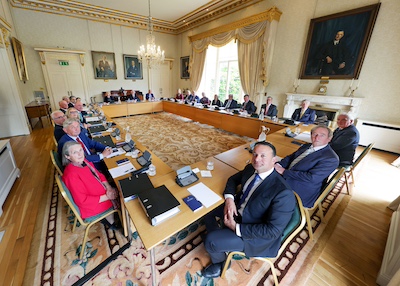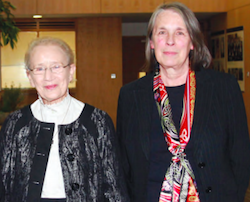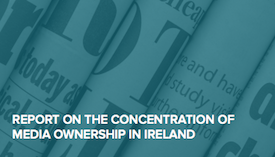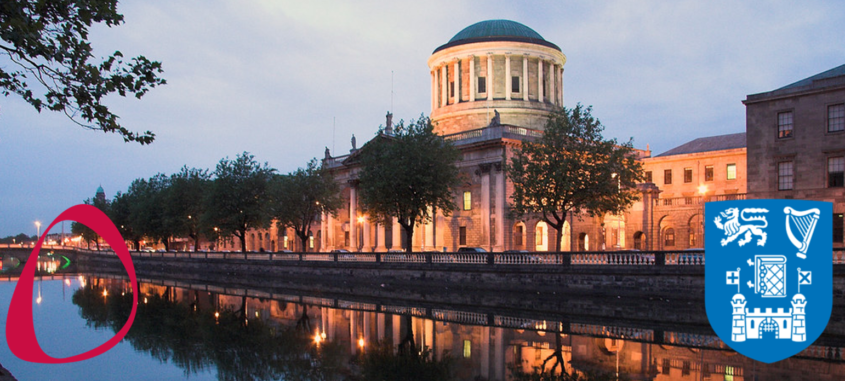 Having considered the Defence (Amendment) Bill 2024 (the Bill) and the advice of the Council of State (pictured left), the President yesterday (Wednesday, 17 July 2024) signed the Bill and it accordingly become law as the Defence (Amendment) Act 2024 (the 2024 Act; update: available here) (see Irish Times, 17 July 2024). Articles 31 and 32 of Bunreacht na Éireann provides provides for a Council of State to aid and counsel the President. Article 26 provides that the President may, after consultation with the Council of State, refer a Bill to the Supreme Court for a decision on its constitutionality. Last Monday, 15 July 2024, the President convened a meeting of the Council of State (pictured left), to hear from the Council regarding the constitutionality of the Defence (Amendment) Bill 2024. In a statement in advance of the meeting, the President said that he intended “to consult the Council of State in particular on Sections 11 and 24 of the Bill and whether the interference with constitutional rights is disproportionate” (see Irish Times, 12 July 2024). Section 11 of the Bill (now Act) restricts the Article 40.6.1(i) right to political expression of a member of the Permanent Defence “while in uniform or otherwise making himself or herself identifiable as a member of the Permanent Defence Force”.…
Having considered the Defence (Amendment) Bill 2024 (the Bill) and the advice of the Council of State (pictured left), the President yesterday (Wednesday, 17 July 2024) signed the Bill and it accordingly become law as the Defence (Amendment) Act 2024 (the 2024 Act; update: available here) (see Irish Times, 17 July 2024). Articles 31 and 32 of Bunreacht na Éireann provides provides for a Council of State to aid and counsel the President. Article 26 provides that the President may, after consultation with the Council of State, refer a Bill to the Supreme Court for a decision on its constitutionality. Last Monday, 15 July 2024, the President convened a meeting of the Council of State (pictured left), to hear from the Council regarding the constitutionality of the Defence (Amendment) Bill 2024. In a statement in advance of the meeting, the President said that he intended “to consult the Council of State in particular on Sections 11 and 24 of the Bill and whether the interference with constitutional rights is disproportionate” (see Irish Times, 12 July 2024). Section 11 of the Bill (now Act) restricts the Article 40.6.1(i) right to political expression of a member of the Permanent Defence “while in uniform or otherwise making himself or herself identifiable as a member of the Permanent Defence Force”.…
Category: Irish Supreme Court
Judges, judging, and the use of academic sources
Next Saturday, 6 November 2021, the third annual conference of the Irish Supreme Court Review will take place online, hosted by the School of Law, Trinity College Dublin and supported by Pinsent Masons. Papers delivered at the conference will reflect major themes in the work of the court and its leading cases in the 2020-2021 legal year. The event will take place online through Zoom. As these papers comment on the work of the Supreme Court, it may be that the Supreme Court will in turn comment on some of these papers.
 Lord Burrows (pictured right), a Justice of the Supreme Court of the United Kingdom, has something to say about that. Last May, he gave a paper to the Annual Conference of Judges of the Superior Courts in Ireland. It was entitled “Judgment-Writing: A Personal Perspective” (pdf). It updates and complements a paper of his from 2013, written when he was Professor of the Law of England in the University of Oxford, entitled “Judgment-Writing: An Academic Perspective” (SSRN). Both papers are very interesting, and the shift in focus from academic to judge is especially so. One paragraph particularly caught my eye (see the 2021 paper at [4](iii) p6; compare the 2013 paper at [3](iii) p5):
Lord Burrows (pictured right), a Justice of the Supreme Court of the United Kingdom, has something to say about that. Last May, he gave a paper to the Annual Conference of Judges of the Superior Courts in Ireland. It was entitled “Judgment-Writing: A Personal Perspective” (pdf). It updates and complements a paper of his from 2013, written when he was Professor of the Law of England in the University of Oxford, entitled “Judgment-Writing: An Academic Perspective” (SSRN). Both papers are very interesting, and the shift in focus from academic to judge is especially so. One paragraph particularly caught my eye (see the 2021 paper at [4](iii) p6; compare the 2013 paper at [3](iii) p5):
…… I think a little more time ought to be spent in judgments, at least involving difficult questions of law, placing the judgment in its wider legal context.
Female-majority panels in the Irish Supreme Court (updated)
 There was some chatter online yesterday about the fact that the UK Supreme Court sat for the first time with a 3-2 female-male majority. The Supreme Court of New Zealand had done so last year. Despite the complement of female justices over the last 20 years, the Supreme Court of Canada doesn’t seem to have had a female majority panel yet. And there haven’t been sufficient female justices on the High Court of Australia for it to have happened there. [For both of these Courts, see now the updates below]. Against that backdrop, I thought I’d find out if and when the Irish Supreme Court had first sat with female majority panels, and this is what I found.
There was some chatter online yesterday about the fact that the UK Supreme Court sat for the first time with a 3-2 female-male majority. The Supreme Court of New Zealand had done so last year. Despite the complement of female justices over the last 20 years, the Supreme Court of Canada doesn’t seem to have had a female majority panel yet. And there haven’t been sufficient female justices on the High Court of Australia for it to have happened there. [For both of these Courts, see now the updates below]. Against that backdrop, I thought I’d find out if and when the Irish Supreme Court had first sat with female majority panels, and this is what I found.
The first majority female panel in the Irish Supreme Court happened more than EIGHTEEN years ago. Denham J was the first woman appointed to the Supreme Court, in 1992; McGuinness J was the second, in January 2000; and a female 2-1 majority on a 3-judge panel of the Supreme Court happened almost immediately after that appointment, in February 2000. In Dalton v Governor of the Training Unit [2000] IESC 49 (29 February 2000) Denham and McGuinness JJ sat with Hardiman J (the image, above left, is of McGuinness J (left) and Denham J (right); for more portraits of these judges, and other Irish legal women trailblazers, see here).…
The Irish Supreme Court begins to enter the television age
When the UK Supreme Court was established in 2009, with the capacity to broadcast its proceedings, I wondered when the Irish Supreme Court would follow suit, and televise its proceedings too. Today, I have the beginnings of an answer. This morning, the Supreme Court televised its proceedings for the first time, when it broadcast the delivery of two judgments. That broadcast should be available, for the next few days at least, via the RTE Player.
Chief Justice Clarke said that the move was aimed at “demystifying” the courts process, and allowing people to “see how their highest court operates”. He also described the move as a “baby step” which could lead to wider filming of the courts in the future. I hope that it will not be long before the Supreme Court routinely broadcasts its proceedings as its UK counterpart does, and there is certainly potential for the broadcast of proceedings of other courts too. The Irish Times said:
…The live broadcasting of court proceedings has been discussed for years but the impetus for it has been attributed to a meeting five years ago between Ms Denham and then RTÉ deputy director general Kevin Bakhurst. Since his appointment as Chief Justice last July, Mr Justice Clarke has been keen to advance the project, and his involvement and support was a crucial factor.
Government may find Collins judgment an unwelcome Christmas present
 I have an OpEd in today’s Irish Times about the decision just before Christmas of the Supreme Court in Collins v Minister for Finance [2016] IESC 73 (16 December 2016). In holding against the challenge by Joan Collins TD to the constitutionality of the 2008 legislation under which the Minister for Finance issued more than €30 billion worth of promissory notes to the Irish Bank Resolution Corporation and the Educational Business Society (EBS), the Supreme Court provided the Government with what was, no doubt, a very welcome Christmas present.
I have an OpEd in today’s Irish Times about the decision just before Christmas of the Supreme Court in Collins v Minister for Finance [2016] IESC 73 (16 December 2016). In holding against the challenge by Joan Collins TD to the constitutionality of the 2008 legislation under which the Minister for Finance issued more than €30 billion worth of promissory notes to the Irish Bank Resolution Corporation and the Educational Business Society (EBS), the Supreme Court provided the Government with what was, no doubt, a very welcome Christmas present.
In the OpEd, I make two points about the decision. First, the Court described the separate roles of the Government and the Oireachtas relating to approving the expenditure of public finances as locks, and held that, if the Oireachtas cannot or will not turn its key in its lock, the government cannot ignore or avoid the Oireachtas, or seek to pick the latter’s lock. Second, on the facts, the Court held that the Government, in enacting and implementing the Credit Institutions (Financial Support) Act 2008 (also here), did not pick any lock on public expenditure for which the Oireachtas had the key. However, this emphasis on the Oireachtas’s lock has the capacity to constrain Government in the future, and the Christmas present in the Collins judgment would not then be quite so welcome to Government after all.…
What are the constitutional issues facing the regulation of media ownership in Ireland?
 A just-published Report on the Concentration of Media Ownership in Ireland (download pdfs here and here) directly addresses the question in the title to this post: what are the constitutional issues facing the regulation of media ownership in Ireland. The Report concludes that such issue do not prevent government action here, and calls on the Irish government to tackle Denis O’Brien’s media control. It seems that some media are ignoring it. That is a pity. It is a very important Report. It was commissioned by Lynn Boylan MEP on behalf of the European United Left/Nordic Green Left (GUE/NGL) group of the European Parliament, and was prepared by Caoilfhionn Gallagher and Jonathan Price, barristers in Doughty Street Chambers, London, and Gavin Booth and Darragh Mackin, of the Belfast solicitors’ firm KRW Law. It was launched in Leipzig (panel | photo) on 6 October last, and in Dublin last night (press notice | photos).
A just-published Report on the Concentration of Media Ownership in Ireland (download pdfs here and here) directly addresses the question in the title to this post: what are the constitutional issues facing the regulation of media ownership in Ireland. The Report concludes that such issue do not prevent government action here, and calls on the Irish government to tackle Denis O’Brien’s media control. It seems that some media are ignoring it. That is a pity. It is a very important Report. It was commissioned by Lynn Boylan MEP on behalf of the European United Left/Nordic Green Left (GUE/NGL) group of the European Parliament, and was prepared by Caoilfhionn Gallagher and Jonathan Price, barristers in Doughty Street Chambers, London, and Gavin Booth and Darragh Mackin, of the Belfast solicitors’ firm KRW Law. It was launched in Leipzig (panel | photo) on 6 October last, and in Dublin last night (press notice | photos).
Here’s a flavour of the Report, from the executive summary [with added links to relevant posts on this site]:
…1.8 In our view, taken together, the combination of the highly concentrated Irish media market, Mr. O’Brien’s threats and initiation of a large number of legal proceedings against media and other critics, and serious shortcomings in the defamation framework create a perfect storm which threatens news plurality and undermines the media’s ability to perform its watchdog function.
A small step towards slightly more open justice in the Irish Supreme Court
 As reported by Ruadhán Mac Cormaic in yesterday’s Irish Times, the Irish Supreme Court is to make written submissions available to the public. This is an excellent development – the public’s right of access to court documents is a very important aspect of the open administration of justice. According to Ruadhán:
As reported by Ruadhán Mac Cormaic in yesterday’s Irish Times, the Irish Supreme Court is to make written submissions available to the public. This is an excellent development – the public’s right of access to court documents is a very important aspect of the open administration of justice. According to Ruadhán:
In a direction to lawyers, posted on the Courts Service website, Ms Justice Denham said the new practice would apply to all submissions sent to the Supreme Court Office as of yesterday. The documents will only be available once the relevant appeal hearing begins.
(Para updated 8 October 2013: updates underlined) I found it hard to track down the relevant Practice Direction: when I wrote this post it is was not yet either on the Courts Service News page or the Supreme Court Practice Directions page, though it is now available on the Practice Directions page. However, on twitter, Ruadhán pointed me to the current Legal Diary (doc | pdf), where I found the following Practice Direction:
…
THE SUPREME COURT PRACTICE DIRECTION
Written Submissions
1. Subject to directions of the Supreme Court and the following paragraphs of this direction, a copy of written submissions lodged in or transmitted to the Supreme Court Office or handed in to the Supreme Court on or after the 7th October, 2013 in relation to, or in the course of, the hearing of any appeal or matter will be made available to any person requesting same, on payment of any fee chargeable for such copy.
The Chief Justice, the Council of State, and Article 26 References to the Supreme Court
 Article 31.1 of the Constitution provides that there “shall be a Council of State to aid and counsel the President on all matters on which the President may consult the said Council …”. The image, left, is a painting of the Council of State hanging in the Council of State Room in Áras an Uachtaráin, the President’s official residence. One matter on which the President must consult the Council of State is provided by Article 26.1.1:
Article 31.1 of the Constitution provides that there “shall be a Council of State to aid and counsel the President on all matters on which the President may consult the said Council …”. The image, left, is a painting of the Council of State hanging in the Council of State Room in Áras an Uachtaráin, the President’s official residence. One matter on which the President must consult the Council of State is provided by Article 26.1.1:
The President may, after consultation with the Council of State, refer any Bill to which this Article applies to the Supreme Court for a decision on the question as to whether such Bill or any specified provision or provisions of such Bill is or are repugnant to this Constitution or to any provision thereof.
On foot of this power, President Higgins convened a meeting of the Council of State to consider whether to refer the Protection of Life During Pregnancy Bill 2013 to the Supreme Court under Article 26; and that meeting is due to begin right about now (see: Irish Examiner here, here, and here | Irish Independent here and here | Irish Times here, here, and here | RTÉ | TheJournal.ie…

